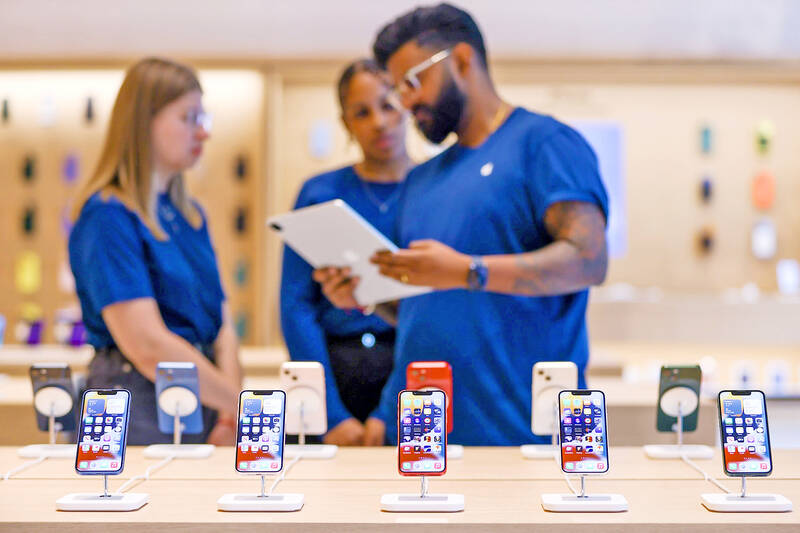Apple Inc has been barred from selling iPhones without a charger in Brazil and fined more than US$2 million over the issue, the Brazilian government said on Tuesday, after accusing the US tech giant of “discriminatory practices.”
In an official notice, Brazilian authorities ordered “the immediate suspension of the distribution of iPhone brand smartphones, regardless of model or generation, that are not accompanied by a battery charger.”
The Brazilian Ministry of Justice and Public Security ordered the California company to pay a fine of 12.28 million reais (nearly US$2.4 million).

Photo: Bloomberg
The measure from the Brazilian Department of Consumer Protection and Defense effectively prohibits the sale of all iPhone 12 and 13 models.
Apple has been under investigation in Brazil since December last year for “the sale of an incomplete product,” “discrimination against the consumer” and “the transfer of responsibility to third parties” by offering iPhone 12s and newer versions without chargers for power outlets, an official statement said.
The company has faced fines from Brazilian state agencies before, but “did not take any measures to minimize the harm and until now continued to sell the cellular devices without chargers,” the statement said.
Brazilian authorities said that Apple alleges that the decision to exclude chargers from iPhone sales comes from an “environmental commitment.”
However, the ministry determined “there is no effective demonstration of environmental protection on Brazilian soil as a consequence” of Apple’s policy, and accused the company of “deliberate discriminatory practices against consumers.”
“There is no justification for an operation which, in aiming to reduce carbon emissions, leads to the introduction into the consumer market of a product whose use depends on the acquisition of another [product] which is also marketed by the company,” the official notice added.
Apple plans to appeal the ban by Brazil, saying the company has helped reduce environmental waste by not including the accessory with new devices.
“At Apple, we consider our impact on people and the planet in everything we do,” the company said in an e-mailed statement. “Power adapters represented our largest use of zinc and plastic and eliminating them from the box helped cut over 2 million metric tons of carbon emissions — equivalent to removing 500,000 cars from the road per year.”
Apple said it would continue working with Brazil’s consumer protection agency to “address their concerns and plan to appeal this decision.”
“We’ve already won a number of court decisions in Brazil on this topic and are confident our customers are aware of the various options to charge and connect their devices,” the company said.
Additional reporting by Bloomberg

In Italy’s storied gold-making hubs, jewelers are reworking their designs to trim gold content as they race to blunt the effect of record prices and appeal to shoppers watching their budgets. Gold prices hit a record high on Thursday, surging near US$5,600 an ounce, more than double a year ago as geopolitical concerns and jitters over trade pushed investors toward the safe-haven asset. The rally is putting undue pressure on small artisans as they face mounting demands from customers, including international brands, to produce cheaper items, from signature pieces to wedding rings, according to interviews with four independent jewelers in Italy’s main

Macronix International Co (旺宏), the world’s biggest NOR flash memory supplier, yesterday said it would spend NT$22 billion (US$699.1 million) on capacity expansion this year to increase its production of mid-to-low-density memory chips as the world’s major memorychip suppliers are phasing out the market. The company said its planned capital expenditures are about 11 times higher than the NT$1.8 billion it spent on new facilities and equipment last year. A majority of this year’s outlay would be allocated to step up capacity of multi-level cell (MLC) NAND flash memory chips, which are used in embedded multimedia cards (eMMC), a managed

In the wake of strong global demand for AI applications, Taiwan’s export-oriented economy accelerated with the composite index of economic indicators flashing the first “red” light in December for one year, indicating the economy is in booming mode, the National Development Council (NDC) said yesterday. Moreover, the index of leading indicators, which gauges the potential state of the economy over the next six months, also moved higher in December amid growing optimism over the outlook, the NDC said. In December, the index of economic indicators rose one point from a month earlier to 38, at the lower end of the “red” light.

The global server market is expected to grow 12.8 percent annually this year, with artificial intelligence (AI) servers projected to account for 16.5 percent, driven by continued investment in AI infrastructure by major cloud service providers (CSPs), market researcher TrendForce Corp (集邦科技) said yesterday. Global AI server shipments this year are expected to increase 28 percent year-on-year to more than 2.7 million units, driven by sustained demand from CSPs and government sovereign cloud projects, TrendForce analyst Frank Kung (龔明德) told the Taipei Times. Demand for GPU-based AI servers, including Nvidia Corp’s GB and Vera Rubin rack systems, is expected to remain high,